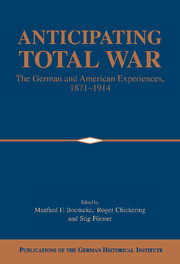Book contents
- Frontmatter
- Introduction
- Part One Germany, The United States, and Total War
- Part Two War and Society
- Part Three Memory and Anticipation: War and Culture
- 11 The American Debate over Modern War, 1871-1914
- 12 Whose War? Whose Nation?: Tensions in the Memory of the Franco-German War of 1870-1871
- 13 War Preparations and National Identity in Imperial Germany
- 14 Military Imagination in the United States, 1815-1917
- 15 Dreams and Nightmares: German Military Leadership and the Images of Future Warfare, 1871-1914
- 16 “A Calamity to Civilization”: Theodore Roosevelt and the Danger of War in Europe
- Part Four The Experience of War
- Index
14 - Military Imagination in the United States, 1815-1917
Published online by Cambridge University Press: 05 January 2013
- Frontmatter
- Introduction
- Part One Germany, The United States, and Total War
- Part Two War and Society
- Part Three Memory and Anticipation: War and Culture
- 11 The American Debate over Modern War, 1871-1914
- 12 Whose War? Whose Nation?: Tensions in the Memory of the Franco-German War of 1870-1871
- 13 War Preparations and National Identity in Imperial Germany
- 14 Military Imagination in the United States, 1815-1917
- 15 Dreams and Nightmares: German Military Leadership and the Images of Future Warfare, 1871-1914
- 16 “A Calamity to Civilization”: Theodore Roosevelt and the Danger of War in Europe
- Part Four The Experience of War
- Index
Summary
During the Cold War, two dominant modes of analysis and interpretation influenced U.S. historians who studied national security behavior. Both approaches were reactions to the sustained Russian-American antagonism that marked the era from 1945 to 1990. The first to appear, the “power realism” popularized by the work of Hans Morgenthau and George F. Kennan, assigned virtue to the United States and vice to the Soviet Union, but its emphasis was on the interaction of nations as the appropriate focus of scholars interested in international behavior - that is, it stressed “external causation.” Assuming a high degree of rationality in the behavior of the Soviet Union, the chief complaint of the power realists was that U.S. foreign policy was too moralistic and idealistic. It required a strong dose of realism to preserve the national interest. The second mode, which became popular during the Vietnam conflict, found expression in the work of the “New Left revisionists,” among them William Appleman Williams and Gabriel Kolko. They argued that the United States, far from being idealistic, was a consciously counterrevolutionary nation, whereas the Soviet Union represented the wave of the future. The United States must therefore abandon its backward outlook and support the goals of international revolution. Otherwise it would suffer eclipse. The internal workings of nations, especially the class struggle, provided a focus for their research and writing. The New Left viewed reform as a “stalking horse” for reaction rather than as a posture distinct from either revolution or reaction.
- Type
- Chapter
- Information
- Anticipating Total WarThe German and American Experiences, 1871–1914, pp. 327 - 342Publisher: Cambridge University PressPrint publication year: 1999
- 1
- Cited by



